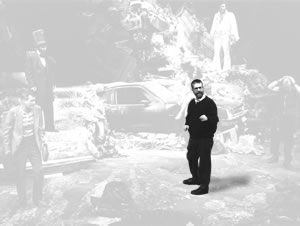
That success is emblematic of the prominence Actors Theatre had achieved by the '90s, but Jory was beginning to think about moving on. His daughter Jessica was considering college, and the pair visited the UW, where Drama Professor Robyn Hunt picked them up at the airport and showed them around.
Near the end of the visit, Hunt asked Jessica to do a monologue for her. "When she finished," Hunt remembers, "Jon said, 'Now Robyn, would you like to show me a monologue?' "

Jory directing on the set of Middle-Aged White Guys, a play by "Jane Martin", who may actually be Jory himself. Photo courtesy Actors Theatre.
Hunt complied and a few months later Jory called her, asking if she would like to come to Louisville to play Lady Capulet in a production of Romeo and Juliet. It was the first of several roles Hunt did there, and it was also the beginning of an ongoing relationship between Jory and the UW School of Drama, which his daughter did choose to attend (she graduates this month). Jory visited and gave a workshop for the Professional Actor Training Program.
Soon after, the effort to bring Jory to the UW began.
Of his decision to leave Actors Theatre, Jory has this to say: "If you work on a car engine for a long period of time, you really don't know how to tune it any better than you've tuned it. And you really don't understand, I think, after a certain point what's possible outside a structure that you've developed. So I sort of felt that way about the theater. I couldn't see any further into the engine so it was a matter of repeating, which didn't seem wildly entertaining.
"Plus, I'd devoted a lot of time to an institution; I was tired of being a boss. I don't know how good that is for you spiritually to be a boss for a very long time. I think it's more fun to build something than to sustain it. I'd very much enjoyed building it. I wasn't as entertained by sustaining it."
The School of Drama is thrilled to have him. "He's a born teacher," Hunt says. "He has tremendous energy, and he tries to bring out the best in each student."

His administrative experience is valued as well. Drama School Director Sarah Nash Gates recalls a staff meeting during which a perennial scheduling problem was being discussed. "Jon asked these wonderful questions, always pretending to be naïve, and he helped us see where we were doing things a certain way because we've always done them that way. He told me afterward, 'An organization should always have somebody new to go to lunch with.' "
In his office in Hutchinson Hall, Jory has mounted photographs of his parents on the walls—many of his father in costume for various movie roles. Occupying a prominent position is a photo of both parents as they appeared in an Actors Theatre production of Long Day's Journey into Night, which he directed. Jory has clearly not forgotten where he came from or all the practical things he learned at the feet of working actors and directors.
These days, however, actors and directors are formally trained and there are fewer veterans around to pass on wisdom. So Jory has written a book, called Tips for Actors, that consists of short pieces of practical, how-to advice on everything from conquering self-consciousness to gracefully handling being fired. He has another book, Tips for Directors, due this spring.
But the lucky students in the School of Drama don't have to read the books. Jory brings his lifetime of experience into the classroom. "I think in training young people it's a combination of experience and theory," he says. "I bring more experience than theory. My value is that I can shortcut problems. I can tell you something that you will learn anyway in 10 years but do you have to wait 10 years to learn it? That, I think, is the most valuable gift I have to offer. I can just cut some time off the process."—Nancy Wick, '97, is editor of University Week, the UW faculty/staff newspaper.